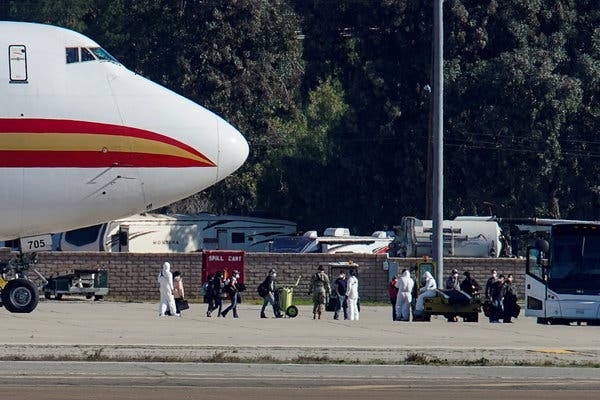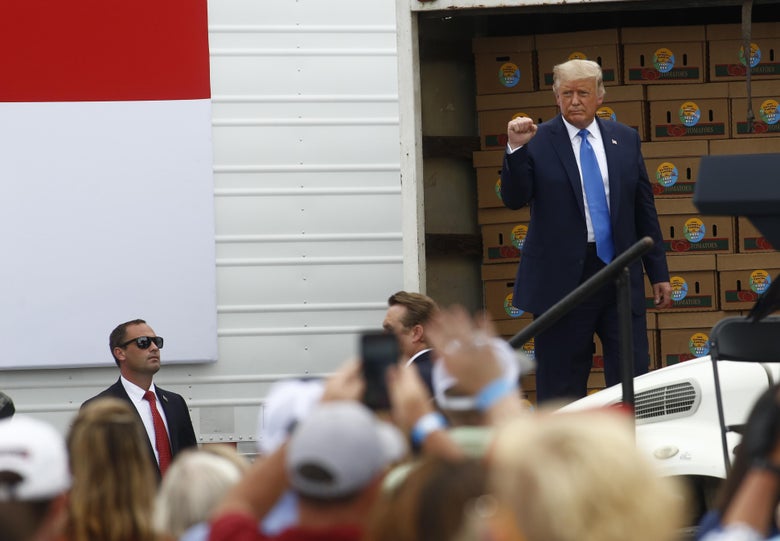Advertisement
Team members were not properly trained, lacked necessary gear and moved freely around and off military bases where Americans were quarantined, a complaint says.

WASHINGTON — Federal health employees interacted with Americans quarantined for possible exposure to the coronavirus without proper medical training or protective gear, then scattered into the general population, according to a government whistle-blower who lawmakers say faced retaliation for reporting concerns.
The team was “improperly deployed” to two military bases in California to assist the processing of Americans who had been evacuated from coronavirus hot zones in China and elsewhere, according to a portion of a narrative account shared with Congress and obtained by The New York Times ahead of a formal complaint to the Office of the Special Counsel, an independent government agency that handles federal whistle-blower complaints.
Staff members from the Department of Health and Human Services’ Administration for Children and Families were sent to Travis Air Force Base and March Air Reserve Base in late January and early February and were ordered to enter quarantined areas, including a hangar where coronavirus evacuees were being received, the complaint said. They were not provided safety-protocol training until five days into their assignment, said the whistle-blower, who is described as a senior leader at the health agency.
Without proper training or equipment, some of the exposed staff members moved freely around and off the bases, with at least one person staying in a nearby hotel and leaving California on a commercial flight. Many were unaware of the need to test their temperatures three times a day.
“I soon began to field panicked calls from my leadership team and deployed staff members expressing concerns with the lack of H.H.S. communication and coordination, staff being sent into quarantined areas without personal protective equipment, training or experience in managing public health emergencies, safety protocols and the potential danger to both themselves and members of the public they come into contact with,” the whistle-blower wrote. House Democrats said on Thursday that the official who voiced concerns to superiors about the situation was subjected to professional retaliation.
In a statement on Thursday, the Department of Health and Human Services acknowledged the complaint, which was first reported by The Washington Post, without elaborating.
“We take all whistle-blower complaints very seriously and are providing the complainant all appropriate protections under the Whistleblower Protection Act,” said Caitlin B. Oakley, a deputy assistant secretary and a national spokeswoman for the Office of the Assistant Secretary for Public Affairs. “We are evaluating the complaint and have nothing further to add at this time.”
A former department official who spoke on the condition of anonymity said that two senior officials there who were directly involved with the situation believed the whistle-blower was making the accusations in an effort to protect their job after being told they would be reassigned. The officials involved contended that the teams were not in any danger, the person said, and that testing was not done because none of the personnel showed symptoms of being sick.
The account surfaced as President Trump seeks to play down the danger of a domestic coronavirus outbreak amid bipartisan concern about a sluggish and disjointed response by the administration to an illness that public health officials have said is likely to spread across the United States. The first American case of coronavirus in a patient with no known contact with hot zones or other coronavirus patients emerged this week near Travis Air Force Base.
The complaint raised questions about whether the Trump administration had taken adequate precautions in its handling of the virus, and whether Mr. Trump’s minimization of the risks had been mirrored by other top officials when confronted with potentially disturbing developments.
The workers who were sent to the scene were not medical professionals and usually help low-income Americans returning to the United States from foreign countries during crises.
In a narrative prepared for Congress, the whistle-blower painted a grim portrait of staff members who found themselves suddenly thrust into a federal effort to confront the coronavirus in the United States. The whistle-blower said their own health concerns were dismissed by senior administration officials as detrimental to staff “morale.” They were “admonished,” the complainant said, and “accused of not being team players,” and had their “mental health and emotional stability questioned.”
After a phone call with health agency leaders to raise their fears about exposure to the virus, the staff members described a “whitewashing” of the situation, characterizing the response as “corrupt” and a “cover-up,” according to the narrative, and telling the whistle-blower that senior officials had treated them as a “nuisance” and did not want to hear their worries about health and safety.
A separate team not connected to the whistle-blower complaint was dispatched to Marine Corps Air Station Miramar in San Diego to help coronavirus evacuees from Wuhan, China, the center of the outbreak, according to two people with direct knowledge of the effort. One of those people said they also lacked protective gear.
At Miramar, one of the people said, guidelines were unclear and sometimes contradictory, and different teams appeared to be following different protocols. Professional cleaning crews in full protective gear — eye and respiratory protection and gloves — cleaned the quarantine area at the same time that Centers for Disease Control and Prevention doctors wearing business suits interacted with evacuees at close range.
Standards were lax at first, this person said, but once patients appeared to become sick, workers began wearing personal protective equipment. One member of the team is now back at work and has yet to be tested for coronavirus exposure, the person added, although the C.D.C. sends daily texts checking in on whether they have symptoms.
Representative Jimmy Gomez, Democrat of California, whose office received the whistle-blower complaint, appeared to allude to it on Thursday morning at a House Ways and Means Committee hearing with Alex M. Azar II, the secretary of health and human services.
“To your knowledge, were any of the A.C.F. employees exposed to high-risk evacuees from China?” Mr. Gomez asked Mr. Azar.
“They should never have been,” Mr. Azar responded, unless they had special suits designed to protect against infection. “To maintain quarantine, that should be the case.”
Mr. Gomez said his understanding was that the teams sent to March and Travis air bases faced a “chaotic” situation.
“I would not accept your proposition that it was chaotic at all times,” Mr. Azar said. “I am not aware of any violation of quarantine or isolation protocols.”
March air base in Riverside, Calif., housed 195 people evacuated from Wuhan, China, for 14 days beginning in late January, while Travis in Northern California has housed a number of quarantined people in recent weeks, including some of the nearly 400 Americans on the Diamond Princess cruise ship that had docked in Japan.
At a hearing of the House Foreign Affairs Committee after the accusations surfaced, William A. Walters, a top medical official at the State Department, denied that any protocols had been broken.
“Every precaution has been taken,” said Dr. Walters, the head of operational medicine at the department’s Bureau of Medical Services. “I can say unequivocally that everyone involved with those evacuations were properly equipped and trained.”
Representative Richard E. Neal, Democrat of Massachusetts and the chairman of the Ways and Means Committee, said the complaint appeared to be part of a pattern of ineptitude and mistrust of civil servants by the Trump administration.
“The president has spent years assaulting our health care system, draining resources from key health programs, and showing utter disdain for career federal employees who are the backbone of our government,” Mr. Neal said in a statement provided to The Times. “It’s sadly no surprise we’re seeing this degree of ineptitude during a terrible crisis.”
Mr. Neal and Mr. Gomez requested additional information on Thursday evening from Mr. Azar, from the inspector general’s office at the Department of Health and Human Services and from the Government Accountability Office, a nonpartisan watchdog, citing the concerns raised in the whistle-blower report.
In a pair of letters, Mr. Neal and Mr. Gomez formally requested a briefing from Mr. Azar within a week, saying that they were “deeply troubled that H.H.S. seems to have ignored valid public health concerns” as well as reports that the agency had retaliated against the whistle-blower instead of taking action.
In the letter to the Government Accountability Office, they expressed concerns that “management decisions at H.H.S. could have contributed to the spread of the virus within the United States.”
Michael D. Shear and Catie Edmondson contributed reporting.

